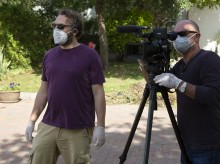VIRUS DIARY: Navigating a flu-like illness in the corona age
 Jerusalem correspondent Aron Heller, left, and cameraman Ami Ben-Tov interview a volunteer delivering food to the home of a doctor on the front lines of Israel's battle against the spread of the coronavirus. (AP Photo/Sebastian Scheiner)
Jerusalem correspondent Aron Heller, left, and cameraman Ami Ben-Tov interview a volunteer delivering food to the home of a doctor on the front lines of Israel's battle against the spread of the coronavirus. (AP Photo/Sebastian Scheiner)
TEL AVIV, Israel (AP) — For those of us from a region where outbursts of violence are an occupational hazard, coping with coronavirus seemed simple enough: Stay at home and you’ll be fine.
For the most part it has been. Other than taking the dog out for walks, I’ve been homebound, working remotely and waiting for the plague to pass.
On April 6, I finally headed out to report on Israeli volunteers aiding those on the pandemic’s front lines. Then I started to develop a sore throat. And an irksome cough. And some shortness of breath.
I reasoned it was a just a cold I had picked up from one of my daughters or a “regular” flu. Still, a panicky climate amid a surge in coronavirus cases left that lingering doubt following my lone sojourn into the outside world.
A brief call to Israel’s national coronavirus hotline made it clear I was a low-priority case. I hadn’t been out of the country recently, hadn’t come in contact with a confirmed coronavirus case and didn’t have a temperature over 38 degrees (100.4 Fahrenheit).
With Israel’s Health Ministry under fire for delivering far less than their promised availability of tests, I was swiftly rejected.
With the country in virtual lockdown, people were also being discouraged from physically visiting doctors for fear of contagion. So, after a phone consultation I started taking an antihistamine and a steroid inhaler for breathing difficulties, while continuing to take cold and flu medication.
For the next week it mostly did the trick. But the symptoms simply wouldn’t go away.
Finally, after two weeks, I went to the local clinic. The physician checked me out and suggested I also use an allergy nasal spray. I asked about a COVID-19 test but was referred to a specialist instead. A nurse added to my confusion by suggesting I get checked for the coronavirus.
“But I don’t have a fever,” I explained.
Irrelevant, she responded, saying many younger people were asymptomatic and my cough and shortness of breath made me a prime candidate.
I was steadily feeling worse with full-body aches and chest pains. Making matters worse, my 1-year-old daughter started running a high fever. I raged at my vacillation, fearing I had not only neglected my own health but exposed my family as well. With a pounding head, I called the coronavirus hotline again to demand a test. After a long exchange, I was rejected once again.
The next day, I visited an ear, nose and throat specialist, where a thorough examination seemed to solve the mystery. It was a bad case of sinusitis. The diagnosis — any diagnosis! — gave me a sense of relief.
But after several days of antibiotics, I was just feeling worse. I was breaking out into alternating fits of sweating and shivering cold. My fever spiked and the aches kept me bed-bound for hours.
I didn’t know what was going on. Could I really be having sinusitis and the worst flu of my life at the same time? I quarantined myself in one of the girls’ rooms and feared something more ominous was going on.
I called the corona hotline a third time. Finally, they relented.
The following day, a young woman in a full-body protective suit and a menacing visor arrived at my door, swabbed my throat and nostril and said I’d get a result in three to five days.
Thankfully, the baby’s fever had broken and no one else in the family was ill. Slowly, I began to recover, waking up pain-free for the first time on April 29. Rolling out of bed, I peeked at my phone.
There was a text message from the Health Ministry.
“The corona test performed on you,” it read, “is negative.”
___
Virus Diary, an occasional feature, showcases the coronavirus saga through the eyes of Associated Press journalists around the world. Follow AP Jerusalem Correspondent Aron Heller at www.twitter.com/aronhellerap
 Contact aron
Contact aron RSS SUBSCRIBE
RSS SUBSCRIBE ALERT
ALERT